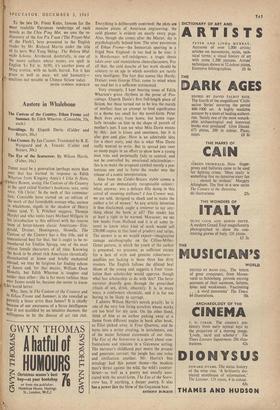Austere in Whalebone
The Eye of the Scarecrow. By Wilson Harris. (Faber, 16s.) THERE must be a generation (perhaps more than One) that has learned its response to Edith Wharton from Kingsley Amis's I Like It Here, where Bowen, seeing The Custom of the Country in the aged exiled Strether's bookcase, says, sotto voce, 'Oh Christ.' In the teeth of this commina- tion, Constable have started on an edition of the work of that formidable woman who, austere in whalebone, stands in the shadow of Henry James (And, V. S. Pritchett suggests, Thomas Hardy) and who ranks (says Michael Millgate in his introduction to this edition) with the reserve team of better-known classic Americans—Fitz- gerald, Dreiser, Hemingway, Howells. The Custom of the Country has a fine title, and is remembered best for that, but it ought to be re- membered for Undine Spragg, one of the most odious female characters of all time. Knowing the book to be about rich Americans chronically disenchanted at home and briefly enchanted. abroad, we may be forgiven for finding echoes of James and, for that matter, William Dean Howells, but Edith Wharton is tougher and colder than either: she is far more ruthless than ever James could be, because she seems to know his world better.
Why, then, in The Custom of the Country and in Ethan Frome and Summer, is she revealed as Patently a lesser artist than James? It is chiefly because of our awareness of a fierce intelligence that it not qualified by an intuitive daemon; the Willingness to let the disease of art run riot. Everything is deliberately contrived; the plots are massive pieces of American engineering: the
cold planner is evident on nearly every page.
Also, though she comes after the Master, she is psychologically behind him. The utter pessimism
of Ethan Frome—the Immortals sporting in a
frigid New England—is too bad to be true; it is Hardyesque self-indulgence; a tragic thesis
takes over and manipulates chess-characters. For all that, the cold douche of her work should be salutary to an age in which novelists are rarely very intelligent. The fact that names like Hardy, Dreiser, even George Eliot, come to mind when we read her is a sufficient testimonial.
Very strangely, 1 kept hearing some of Edith Wharton's grave rhythms in the prose of Pro- vidings, Elspeth Davie's first full-length piece of
fiction, but these turned out to be less the march of intellect than an attempt to lend significance to a theme too small for the novel-form. Peter Beck lives away from home, but home regu- larly intrudes on him in the shape of parcels of mother's jam. I can see what Miss Davie means by this: jam is kisses and sweetness, but it is also goo and glue. Here is an admirable idea for a short story, and this is what Miss Davie really wanted to write. But to spread jam over so many pages in an effort to show how a young man tries and perpetually fails to control, and not be controlled by, emotional relationships— this is to make the pregnant symbol merely a pre- tentious one and to force the reader into the release of a comic interpretation.
Also from the Calder-Boyars stable comes a horse of an immediately recognisable colour:
what, anyway, was a delicate filly doing in this corral of steaming stallions? 1 Jan Cremer was,
we are told. 'designed to shock and to make the author a lot of money.' As any artistic intention is thus disclaimed, ought a, reviewer to say any- thing about the book at all? The reader has at least a right to be warned. Moreover, we see few books from Holland and it is of some in- terest to know what kind of work would sell 250,000 copies in that land of prudery and tulips. The answer is as we would expect—imaginative teenage autobiography on the Celine-Miller- Genet pattern, in which the youth of the author is presented, we presume, as sufficient excuse
for a lack of style and genuine robustness—
qualities not lacking in those three fine dirty masters. The English follows the diluted beat idiom of the young and suggests a freer trans- lation than scholarship would approve, though what has scholarship to do with this? The hero- narrator drearily goes through the prescribed rituals of sex, drink, obscenity. It is, in many ways, a conformist chronicle, and it is far too boring to be likely to corrupt. I admire Wilson Harris's novels greatly; he is one of the very few living novelists whose works
are too brief for my taste. On the other hand, think of him as an author picking away at a theme from different angles in book after book, as Eliot picked away in Four Quartets, and he turns into a writer creating, in instalments, one of the major fictional statements of our time. The Eye of the Scarecrow is a novel about con- frontations and tensions in a Guyanese setting. The narrator's childhood past meets the present and generates current; the jungle has one voice and civilisation another. Mr. Harris's fine tetralogy had this potent theme—the modern man's thrust against the wild, the wild's counter- thrust—as well as a poetry not usually. asso- ciated with the novel-form. The Eye of the Scare- crow has, if anything, a deeper poetry. It also has a power like the blow of the Guyanese heat.
ANTHONY BURGESS






































 Previous page
Previous page